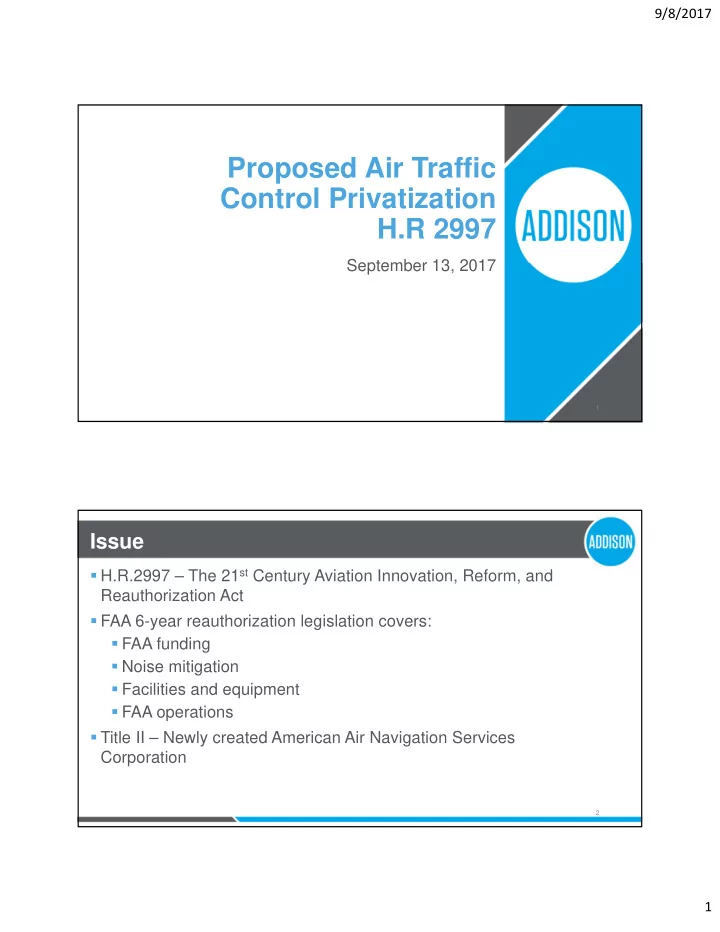

9/8/2017 Proposed Air Traffic Control Privatization H.R 2997 September 13, 2017 1 Issue H.R.2997 – The 21 st Century Aviation Innovation, Reform, and Reauthorization Act FAA 6-year reauthorization legislation covers: FAA funding Noise mitigation Facilities and equipment FAA operations Title II – Newly created American Air Navigation Services Corporation 2 1
9/8/2017 Issue Title II transfers operations of air traffic services and related assets from FAA to a separate not-for-profit corporate entity to provide air traffic control services Establishes the American Air Navigation Services Corporation To assume control of air traffic control services on October 1, 2020 Creates a 13-member board Airline, general aviation, business aviation, air traffic controller, airport representatives 3 What is the problem being solved? Transportation and Infrastructure Committee stated goals of reauthorization legislation: Cut red tape Encourage American innovation in aviation technologies Give traveling public a better flight experience Ensure airport infrastructure connects businesses and people to the world Ensure access to the aviation system for all who need it Provide a safe, efficient, modern system that uses 21 st century technology 4 2
9/8/2017 What is the problem being solved? Privatization of Air Traffic Control (ATC) stated goals: Modernize the system Move from outdated radar to modern technology Counteract short-term reauthorizations, political interference and budget uncertainty Allow FAA to focus on safety of the system Frees ATC from governmental inherent bureaucratic inertia and funding uncertainty 5 Pros of Privatization Could improve funding certainty Previous authorization took 5 years and 23 short-term extensions to complete Removes ATC from political wrangling Allows FAA to focus on safety as main mission Allows more nimble response to technology advances Exempts General Aviation operations from charges and fees 6 3
9/8/2017 Cons of Privatization Potential of loss or reduction of service to smaller communities that are not served by airlines Could create approach or departure procedures that favor airlines at commercial service airports Removes Congressional oversight; accountability to the voters If revenue does not keep pace with expenditures, Federal funding would still be needed or services could be cut, or both Could result in loss of ATC service for non-commercial service airports Increased ticket prices to close gap 7 What are other airports doing? Denton Municipal – Opposes privatization but has not sent letters Mesquite – Opposes privatization but has not sent letters McKinney – Opposes privatization and has sent letters through their lobbyist Fort Worth – Opposes privatization but has not sent letters 8 4
9/8/2017 Why should we oppose this? The proposal to privatize Air Traffic Control services give too much control to airlines and commercial service airports Does not solve delay issues that are primarily (80%) caused by weather and airline compression of flight schedules Decision could be made to close towers or cut hours of operations to cut costs Departure and approach procedures could be implemented that favor commercial service airlines and restrict GA operations Removes Congressional oversight and assistance; any appeal of decisions made would go through courts 9 Questions 10 5
Recommend
More recommend